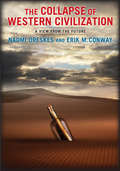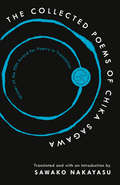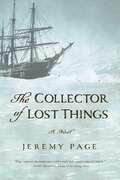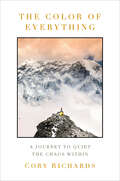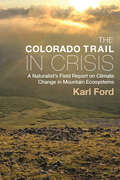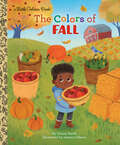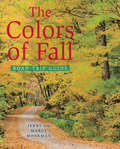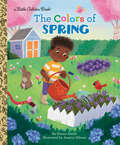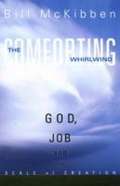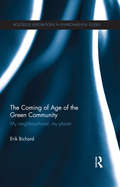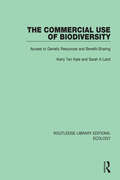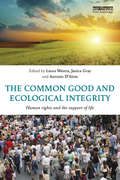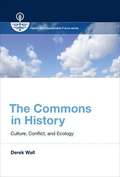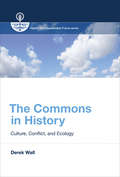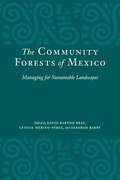- Table View
- List View
The Cold Vanish: Seeking the Missing in North America's Wildlands
by Jon BillmanFor readers of Jon Krakauer and Douglas Preston, the critically acclaimed author and journalist Jon Billman's fascinating, in-depth look at people who vanish in the wilderness without a trace and those eccentric, determined characters who try to find them.These are the stories that defy conventional logic. The proverbial vanished without a trace incidences, which happen a lot more (and a lot closer to your backyard) than almost anyone thinks. These are the missing whose situations are the hardest on loved ones left behind. The cases that are an embarrassment for park superintendents, rangers and law enforcement charged with Search & Rescue. The ones that baffle the volunteers who comb the mountains, woods and badlands. The stories that should give you pause every time you venture outdoors.Through Jacob Gray's disappearance in Olympic National Park, and his father Randy Gray who left his life to search for him, we will learn about what happens when someone goes missing. Braided around the core will be the stories of the characters who fill the vacuum created by a vanished human being. We'll meet eccentric bloodhound-handler Duff and R.C., his flagship purebred, who began trailing with the family dog after his brother vanished in the San Gabriel Mountains. And there's Michael Neiger North America's foremost backcountry Search & Rescue expert and self-described "bushman" obsessed with missing persons. And top researcher of persons missing on public wildlands Ex-San Jose, California detective David Paulides who is also one of the world's foremost Bigfoot researchers. It's a tricky thing to write about missing persons because the story is the absence of someone. A void. The person at the heart of the story is thinner than a smoke ring, invisible as someone else's memory. The bones you dig up are most often metaphorical. While much of the book will embrace memory and faulty memory -- history -- The Cold Vanish is at its core a story of now and tomorrow. Someone will vanish in the wild tomorrow. These are the people who will go looking.
The Cold and Hot Winter (The hot & Cold Series)
by Johanna HurwitzFifth grader Derek and his best friend Rory are delighted when their neighbor's niece Bolivia comes to town for another visit, until a lot of missing objects make Derek begin to doubt Rory's honesty.
The Collapse of Western Civilization
by Naomi Oreskes Erik M. ConwayThe year is 2393, and a senior scholar of the Second People's Republic of China presents a gripping and deeply disturbing account of how the children of the Enlightenment, the political and economic elites of the so-called advanced industrial societies, entered into a Penumbral period in the early decades of the twenty-first century, a time when sound science and rational discourse about global change were prohibited and clear warnings of climate catastrophe were ignored. <P><P>What ensues when soaring temperatures, rising sea levels, drought, and mass migrations disrupt the global governmental and economic regimes? <P><P>The Great Collapse of 2093.This work is an important title that will change how readers look at the world. Dramatizing climate change in ways traditional nonfiction cannot, this inventive, at times humorous work reasserts the importance of scientists and the work they do and reveals the self-serving interests of the so called "carbon industrial complex" that have turned the practice of sound science into political fodder. <P><P>The authors conclude with a critique of the philosophical frameworks, most notably neo-liberalism, that do their part to hasten civilization's demise. <P><P>Based on sound scholarship yet unafraid to tilt at sacred cows in both science and policy, this book provides a welcome moment of clarity amid the cacophony of climate change literature. It includes a lexicon of historical and scientific terms that enriches the narrative and an interview with the authors.
The Collapse of Western Civilization: A View from the Future
by Naomi Oreskes Erik ConwayThe year is 2393, and the world is almost unrecognizable. Clear warnings of climate catastrophe went ignored for decades, leading to soaring temperatures, rising sea levels, widespread drought and—finally—the disaster now known as the Great Collapse of 2093, when the disintegration of the West Antarctica Ice Sheet led to mass migration and a complete reshuffling of the global order. Writing from the Second People's Republic of China on the 300th anniversary of the Great Collapse, a senior scholar presents a gripping and deeply disturbing account of how the children of the Enlightenment—the political and economic elites of the so-called advanced industrial societies—failed to act, and so brought about the collapse of Western civilization. In this haunting, provocative work of science-based fiction, Naomi Oreskes and Eric M. Conway imagine a world devastated by climate change. Dramatizing the science in ways traditional nonfiction cannot, the book reasserts the importance of scientists and the work they do and reveals the self-serving interests of the so called "carbon combustion complex" that have turned the practice of science into political fodder. Based on sound scholarship and yet unafraid to speak boldly, this book provides a welcome moment of clarity amid the cacophony of climate change literature.
The Collapse of the Eastern Mediterranean
by Ronnie EllenblumAs a 'Medieval Warm Period' prevailed in Western Europe during the tenth and eleventh centuries, the eastern Mediterranean region, from the Nile to the Oxus, was suffering from a series of climatic disasters which led to the decline of some of the most important civilisations and cultural centres of the time. This provocative study argues that many well-documented but apparently disparate events – such as recurrent drought and famine in Egypt, mass migrations in the steppes of central Asia, and the decline in population in urban centres such as Baghdad and Constantinople – are connected and should be understood within the broad context of climate change. Drawing on a wealth of textual and archaeological evidence, Ronnie Ellenblum explores the impact of climatic and ecological change across the eastern Mediterranean in this period, to offer a new perspective on why this was a turning point in the history of the Islamic world.
The Collected Poems of Chika Sagawa (Modern Library Torchbearers)
by Chika SagawaWinner of the PEN Award for Poetry in Translation • The electrifying collected works of &“one of the most innovative and prominent avant-garde poets in early twentieth-century Japan&” (The New Yorker). Translated by and with an introduction by Sawako NakayasuAn important and daringly experimental voice in Tokyo&’s avant-garde poetry scene, Chika Sagawa broke with the gender-bound traditions of Japanese poetry. Growing up in isolated rural Japan, Sagawa moved to Tokyo at seventeen, and begin publishing her work at eighteen.She was immediately recognized as a leading light of the male-dominated Japanese literary scene; her work combines striking, unique imagery with Western influences. The results are short, sharp, surreal poems about human fragility and the beauty of nature from Japan&’s first female Modernist poet. The Modern Library Torchbearers series features women who wrote on their own terms, with boldness, creativity, and a spirit of resistance. AMERICAN INDIAN STORIES • THE AWAKENING • THE CUSTOM OF THE COUNTRY • THE HEADS OF CERBERUS • LADY AUDLEY&’S SECRET • LOVE, ANGER, MADNESS • PASSING • THE RETURN OF THE SOLDIER • THERE IS CONFUSION • THE TRANSFORMATION OF PHILIP JETTAN • VILLETTE
The Collected Works of Ralph Waldo Emerson Volume I: Nature, Addresses, and Lectures
by Ralph Waldo Emerson Alfred R. Ferguson Robert E. Spiller Waldron P. BelknapRecords the creative and intellectual development of Emerson as a man of letters through a collection of his writings.
The Collector of Lost Things
by Jeremy PageThe year is 1845 and young researcher Eliot Saxby is paid to go on an expedition to the Arctic in the hope of finding remains of the by now extinct Great Auk. He joins a hunting ship, but the crew and the passengers are not what they seem. Caught in the web of relationships on board, Eliot struggles to understand the motivations of the sociopathic Captain Sykes; the silent First Mate, French; the flamboyant laudanum-addicted Bletchley; and most importantly of all, Bletchley's beautiful but strange 'cousin' Clara. As the ship moves further and further into the wilds of the Arctic sea, Eliot clings to what he believes in, desperate to save Clara but drawn irrevocably back into the past that haunts him.
The Color of Everything: A Journey to Quiet the Chaos Within
by Cory RichardsA renowned climber and National Geographic photographer shares his incredible adventures—and the early trauma that drove him to seek such heights.&“An extraordinary memoir of mental illness that reads like a thriller.&”—Amy Ellis Nutt, Pulitzer Prize–winning journalist and author of Becoming Nicole&“In order to escape madness, I will live madly. I will risk my life in order to save it.&”Growing up in the mountains of Utah, Cory Richards was constantly surrounded by the outdoors. His father, a high school teacher and a ski patroller, spent years teaching Richards and his brother how to ski, climb, mountaineer, and survive in the wild. Despite a seemingly idyllic childhood, the Richards home was fraught with violence, grief, and mental illness. After being diagnosed with bipolar disorder and dropping out of high school, Richards subsumed himself in the worlds of photography and climbing, seeking out the farthest reaches of the world to escape the darkness. Then, in the midst of a wildly successful career in adventure photography, a catastrophic avalanche changed everything, forcing Richards to confront the trauma of his past, evaluate his own mental health, and learn to rewrite his story.The Color of Everything is a thrilling tale of risk and adventure, written by a man who has done it all: He&’s stood at the top of the world, climbed imposing mountain faces alone in the dark, and become the only American to summit an 8,000-meter peak in winter. But it is also the story of a tumultuous life—a stirring, lyrical memoir that captures the profound musings of an unquiet mind grappling with the meaning of success, the cost of fame and addiction, and whether it is possible to outrun your demons. With exquisite prose and disarming candor, accompanied by stunning photos from his career, Richards excavates the roots of his trauma and shares what it took for him to climb out of it.
The Colorado Trail in Crisis: A Naturalist’s Field Report on Climate Change in Mountain Ecosystems
by Karl FordThe Colorado Trail in Crisis addresses the sweeping transformation of western forests and wilderness ecosystems affected by climate change. This book is equal parts trail journal and synthesis of natural and human history. Karl Ford uses research on climate impacts to forests, wildlife, hydrology, and more to stress the urgent need for an action plan to reduce greenhouse gases and save forests and watersheds. Using his hike along the popular five-hundred-mile Colorado Trail to present his personal observations about more than a hundred miles of dead and dying forest, Karl Ford presents a brief environmental history of these areas of the state, weaving in scientific studies about forest mortality caused by insect infestations, wildfire, drought, and loss of snowpack, and describes the poor current prospects for reforestation as the climate continues to warm. His own Lakota ancestry, as well as historical references to local Tabeguache Ute Chief Ouray and displaced Ute populations, meaningfully frames important conversations about caretaking and connection to place. Ford also proposes potential solutions to drought and forest mortality problems, as well as varying approaches and limitations to mitigation efforts. The Colorado Trail in Crisis appeals to hikers and nature lovers seeking to learn about the natural history, beauty, and serenity of the Colorado Trail, as well as students, conservationists, and scientists researching climate change effects on Colorado mountain ecosystems.
The Colored Pencil Manual: Step-by-Step Instructions and Techniques (Dover Art Instruction Ser.)
by Veronica WintersExperienced artists looking to master a new medium will relish this comprehensive guide to using colored pencils by Veronica Winters, author of How to Color Like an Artist. Step-by-step projects with photos and directions illustrate the many details that bring a simple composition to brilliant life, offering readers a comprehensive overview of colored pencil techniques.A brief introduction covers necessary materials and explains the book's overall approach, and subsequent chapters address specific techniques. Each lesson features color swatches that match the colors of different pencil brands, as well as the type of drawing paper and other supplies that will work best for the artwork. Winters expertly covers such techniques as shading and blending and discusses a wealth of other topics, including the importance of light, composition, drawing solid objects in 3-D, color theory, how to draw textures and fabric, how to create symmetrical shapes, and many other aspects of colored pencil drawing.
The Colors of Fall (Little Golden Book)
by Danna SmithThis rhyming Little Golden Book celebrates all the bright and beautiful colors of the fall season!YELLOW are the leavesfalling to the ground.GRAY is the tractorthat makes a rumbling sound. . . .Preschoolers will enjoy this lively poem about all the festive colors of fall as they look at the beautiful illustrations showing a young boy enjoying the day at a pumpkin patch and petting farm. From red apples to gold hay bales to a white pony, there's so much to explore! It's a perfect companion to The Colors of Summer and The Colors of Winter.
The Colors of Fall Road Trip Guide
by Jerry Monkman Marcy MonkmanOn the coffee table or in the glove compartment, it’s the perfect fall foliage road trip companion. The Colors of Fall Road Trip Guide details 25 of the best scenic tours during fall foliage season in New England. Trips vary from short drives on the coast to all-day excursions in the region’s mountains and forests. Detailed maps and itineraries compliment trip descriptions that tell you what you’ll find along the route. GPS coordinates are also included for trip “hot spots.” In addition, sidebars suggest short walks and hikes that are great diversions when a little leg-stretching is required. This is the perfect companion for any leaf-peeping excursion. Here are just a handful of the beautiful foliage sites and tours the Monkmans will guide you through: Vermont’s Northeast Kingdom: Groton State Forest, Cabot, and Peacham A Covered Bridge Tour of Southwestern New Hampshire Maine’s Western Lakes Region The Southern Berkshires: Hay Fields, Waterfalls, and Cobbles Rhode Island’s Beaches and Mansions: Westerly to Newport The Connecticut Highlands: North Meets South A Connecticut River Tour in Southern Vermont and New Hampshire Maine’s Big Woods: The Kennebec Valley and Moosehead Lake
The Colors of Spring (Little Golden Book)
by Danna SmithThis rhyming Little Golden Book celebrates all the blooming, bright, and beautiful colors of the spring season!ORANGE is the door of Grandpa's garden shed.BROWN is the soil that fills the flower bed. . . .Preschoolers will enjoy hearing the rhyming tale of a young boy and his grandfather gardening on a lovely spring day. The beautiful illustrations highlight the different colors to be seen including green weeds, purple flowers, yellow butterflies, and pink lemonade! It's the perfect companion to the Little Golden Books The Colors of Winter, The Colors of Summer, and The Colors of Fall.
The Colors of Summer (Little Golden Book)
by Danna SmithCelebrate the colors of summer with Little Golden Books!TURQUOISE is the beach towel--room enough for three. PURPLE are my flip-flops.No more shoes for me! Spend a fun-filled summer day at the beach and discover the bright colors all around. Kids will love finding their favorites, from purple flip-flops and orange sand shovels to green towels and blue waves. This bright summer read will have little ones eager to visit this colorful beach time and time again.
The Colors of Winter (Little Golden Book)
by Danna SmithThis Little Golden Book celebrates all the bright and beautiful colors of winter!WHITE is out the window. Look at all the snow!RED is Grandma's old sled. Up the hill we go. . . .Preschoolers will enjoy this lively poem about all the festive colors of winter. They'll gaze at the cheerful, textured illustrations of a girl playing outside on a snowy day until it's time to warm up inside--over hot cocoa with Grandma. "TURQUOISE is the handle of my favorite cup. BROWN is hot cocoa that warms my insides up. . . ." This story, by one of today's acclaimed picture-book authors, has the feel of a cherished classic. A perfect companion to The Colors of Summer!
The Comforting Whirlwind: God, Job, and the Scale of Creation
by Bill MckibbenIn The Comforting Whirlwind, Bill McKibben turns to the biblical book of Job to demonstrate our need to embrace a bold new paradigm for living, if we hope to reverse the current trend of ecological destruction.
The Coming Indoors and Other Poems
by Bernard Lionel EinbondThis collection of haiku poetry from Bernard Lionel Einbond is a spectacular.Part one includes Rising Darkness, Countenances of the Poor, and The Coming Indoors, then part two concludes with Insomnia in Haiku Form. Each poem expressed paints a simple mental picture of each experience with Bernard:-The bright one starin the black wide sky...observethe old wise owl.-Have you ever heardthe sound of snowflakes fallingon the snow? Listen.he snow? Listen.
The Coming of Age of the Green Community: My neighbourhood, my planet (Routledge Explorations in Environmental Studies)
by Erik BichardPeople organising to protect their environment is not a new phenomenon, but the groups that have been pushing for environmental change since the 1970s have not convinced sufficient numbers make sustainable decisions or to lead sustainable lives. Governments have serially failed to do the job at the international level. Now, climate change, resource depletion and widening social aspirations threaten to destabilise human society unless sustainable change can be influenced from another direction. The Coming of Age of the Green Community explores the activities of a new generation of community-led initiatives that may herald the beginnings of the next wave of activism. Erik Bichard combines the testimonies of dozens of group activists with historic evidence and the views of a range of commentators from a variety of disciplines to put forward reasons why some green community groups succeed while others fail. He concludes with a valuable prescription for both existing and emerging groups on how to be sustainable, both over time and in their actions. This book address one of the key questions of the twenty-first century: has the local perspective on this universal concern finally come of age?
The Commercial Use of Biodiversity: Access to Genetic Resources and Benefit-Sharing (Routledge Library Editions: Ecology #15)
by Sarah A Laird Kerry Ten KateOriginally published in 1999 The Commercial Use of Biodiversity examines how biodiversity and the genetic material it contains are now as valuable resources. Access to genetic resources and their commercial development involve a wide range of parties such as conservation and research institutes, local communities, government agencies and companies. Equitable partnerships are not only crucial to conservation and economic development but are also in the interests of business and often required by law. In this authoritative and comprehensive volume, the authors explain the provisions of the Convention on Biological Diversity on access and benefit-sharing, the effect of national laws to implement these, and aspects of typical contracts for the transfer of materials. They provide a unique sector-by-sector analysis of how genetic resources are used, the scientific, technological and regulatory trends and the different markets in Pharmaceuticals, Botanical Medicines, Crop Development, Horticulture, Crop Protection, Biotechnology (in fields other than healthcare and agriculture) and Personal Care and Cosmetics Products. This will be an essential sourcebook for all those in the commercial chain, from raw material collection to product discovery, development and marketing, for governments and policy-makers drafting laws on access and for all the institutions, communities and individuals involved in the conservation, use, study and commercialisation of genetic resources.
The Common Angler: A Celebration of Fishing
by Jack WollitzCollects over thirty fun, perceptive, and insightful essays by longtime journalist/fisherman Jack Wollitz, who writes with uncommon eloquence as he celebrates the primordial connection of people to fish and fishing. "If you want a book that gives you a pure and down to earth take on why we fish, you should give this one a read. Jack Wollitz did an awesome job telling us exactly why through his personal journey." —Joe Thomas, TV Host of Reel in the Outdoors The Common Angler taps into the passion that simmers in the souls of anglers and celebrates the primordial connection of people to fish and fishing. Author Jack Wollitz set out to explain the &“why&” behind the fact that so many people are passionate about fishing and along the way discovered a book&’s worth of experiences and stories. Early chapters cover the foundation of Jack&’s own passion for fishing and explore the connection we have with water and the creatures that depend on it for life. The Common Angler explores fishing friendships, relationships, and observations; extraordinary experiences; and the value of personal time on the water. Also included is a whimsical piece that personifies two common waterside fixtures. A key chapter draws parallels between the legendary River Lea in Izaak Walton&’s The Compleat Angler, written in the mid-seventeenth century, and Northeast Ohio&’s Mahoning River and the mighty Ohio River. The Common Angler also provides an insider&’s perspective about what makes certain people great anglers, featuring two Northeast Ohio men known for their fishing accomplishments, as well as Ernest Hemingway, baseball stars Ted Williams and Wade Boggs, and Rick Clunn, considered the greatest bass angler of all time. The book advances with chapters that explore the development and popularity of competitive fishing, the therapeutic value of fishing when times are difficult, and even the pain and suffering dedicated anglers sometimes endure. The Common Angler concludes with an examination of the obligations anglers shoulder and how we can grow with our passion. &“Next time you go to the water, open your eyes wider than ever before. Listen like your ears are amplifiers. Breathe with a purpose, deep and slow, so every molecule of nature checks in with your brain. Feel the sun. Touch the water. Ask yourself why you are there and what you intend to accomplish. Do this and you will be fishing. Do it every time and you will open a new chapter in your life as an angler.&”
The Common Good and Ecological Integrity: Human Rights and the Support of Life
by Laura Westra Janice Gray Antonio D'AloiaProponents of the concept of ecological integrity argue that it is a necessary component of global governance on which the sustainable future of the planet and its inhabitants depends. This book presents the latest research and current thinking on the role of ecological integrity in support of life on Earth and the importance of governance for the common good, or the benefit of all. The book considers whether present forms of governance support the common good, or whether they are endangering its very foundations. It explores the connection between consumerism and capitalism, the destruction of natural resources and with it, the elimination of many of the ecosystem services that support life in general, and human life in particular. Chapters focus on the defence of human rights, and in particular the rights to key resources such as food, water and general health/wellbeing, as well as energy and security. Topics covered include climate change, biodiversity, migration and conflict resolution, with approaches from various perspectives such as politics, ethics, sociology and law. Overall the book provides a stimulating insight into the multifaceted debates surrounding ecological integrity, global governance and sustainability.
The Commons in History
by Derek WallAn argument that the commons is neither tragedy nor paradise but can be a way to understand environmental sustainability.
The Commons in History: Culture, Conflict, and Ecology (History for a Sustainable Future)
by Derek WallAn argument that the commons is neither tragedy nor paradise but can be a way to understand environmental sustainability.The history of the commons—jointly owned land or other resources such as fisheries or forests set aside for public use—provides a useful context for current debates over sustainability and how we can act as “good ancestors.” In this book, Derek Wall considers the commons from antiquity to the present day, as an idea, an ecological space, an economic abstraction, and a management practice. He argues that the commons should be viewed neither as a “tragedy” of mismanagement (as the biologist Garrett Hardin wrote in 1968) nor as a panacea for solving environmental problems. Instead, Walls sees the commons as a particular form of property ownership, arguing that property rights are essential to understanding sustainability. How we use the land and its resources offers insights into how we value the environment.After defining the commons and describing the arguments of Hardin's influential article and Elinor Ostrom's more recent work on the commons, Wall offers historical case studies from the United States, England, India, and Mongolia. He examines the power of cultural norms to maintain the commons; political conflicts over the commons; and how commons have protected, or failed to protect ecosystems. Combining intellectual and material histories with an eye on contemporary debates, Wall offers an applied history that will interest academics, activists, and policy makers.
The Community Forests of Mexico: Managing for Sustainable Landscapes
by David Barton Bray Merino-Pérez Leticia Deborah BarryThe contributors to this book are established researchers in the field, as well as many of the important actors in Mexico's nongovernmental organization sector. Some articles are case studies of community forest management programs in the states of Michoacán, Oaxaca, Durango, Quintana Roo, and Guerrero. Others provide broader historical and contemporary overviews of various aspects of community forest management. As a whole, this volume clearly establishes that the community forest sector in Mexico is large, diverse, and has achieved unusual maturity in doing what communities in the rest of the world are only beginning to explore: how to balance community income with forest conservation. In this process, Mexican communities are also managing for sustainable landscapes and livelihoods.


